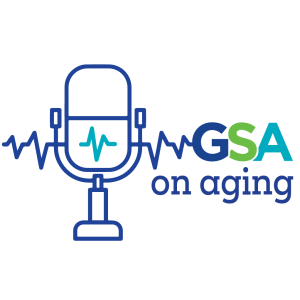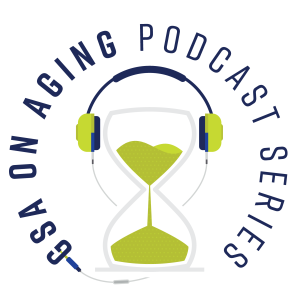GSA on Aging
The Gerontological Society of America (GSA) brings together educators, clinicians, administrators, researchers, and students who share their experiences, expertise, and innovations in aging. The GSA On Aging Podcast series covers a wide range of topics related to aging and gerontology. It features interviews with experts and discussions on research papers published in various GSA journals. The series explores various aspects of aging, including dementia, technology, ageism, age-friendly communities, and other relevant issues affecting older adults.
The Gerontological Society of America (GSA) brings together educators, clinicians, administrators, researchers, and students who share their experiences, expertise, and innovations in aging. The GSA On Aging Podcast series covers a wide range of topics related to aging and gerontology. It features interviews with experts and discussions on research papers published in various GSA journals. The series explores various aspects of aging, including dementia, technology, ageism, age-friendly communities, and other relevant issues affecting older adults.
Episodes

Wednesday Sep 15, 2021
Wednesday Sep 15, 2021
Conversations about death and dying are difficult for everyone, but they are especially important for older adults. In this podcast episode, Dr. Deborah Carr and host Brenda Olmos discuss how to bring up these topics in a way that is sensitive, culturally appropriate, and efficient for both patients and providers. Along the way, they talk about their personal experiences related to end-of-life issues, how those experiences led to their interest in gerontology, and how they can bridge the gap between research and practice in end-of-life care.
Guest: Deborah Carr, PhD, FGSA (Bio)—Professor and Chair, Department of Sociology, and Senior Fellow, Institute for Health System Innovation and Policy, Boston University.
Host: Brenda Olmos, MSN, APRN, FNP-C (Bio)—Reynolds Scholar, University of Oklahoma, Reynolds Center for Geriatric Nursing Excellence.
This podcast episode is supported by the GSA Innovation Fund: 75th Anniversary.

Wednesday Sep 08, 2021
Science and Storytelling: Family Caregiving and Older Adults
Wednesday Sep 08, 2021
Wednesday Sep 08, 2021
Approximately 42 million family caregivers in the United States provide unpaid care for an older adult. Family caregivers can spend countless hours engaging in complex activities—such as medication management, wound care, and care coordination—that can influence their own financial security, health, and well-being. In this episode, Dr. Susan Reinhard talks with host Dr. Jo-Ana Chase about the science and policies impacting family caregiving in the United States and how Dr. Reinhard’s nursing practice influenced her path to science and policy making.
Guest: Susan Reinhard, RN, PhD, FGSA, FAAN (Bio)—Senior Vice President and Director, AARP Public Policy Institute, and Chief Strategist, AARP Center to Champion Nursing in America and Family Caregiving Initiatives.
Host: Jo-Ana D. Chase, PhD, APRN-BC (Bio)—Associate Professor, University of Missouri Sinclair School of Nursing.

Wednesday Sep 01, 2021
Wednesday Sep 01, 2021
Older adults are essential workers, caregivers, and volunteers. They provide many services in the community as volunteer drivers for Meals on Wheels, tutors and mentors for school programs, and other meaningful roles. Ways to shape social policies and programs to optimally engage the growing human capital of the older population is a compelling issue. In addition to discussing her research career path as a social worker, Dr. Nancy Morrow-Howell talks with hosts Rita Xiaochen Hu and Hanamori Skoblow about why older adults are essential and productive members of the community and how we as a society can resist ageism. This podcast episode was inspired by the GSA 75th Anniversary Spotlight Article by Dr. Morrow-Howell and Ernest Gonzales, MSW, PhD, “Recovering From Coronavirus Disease 2019 (COVID-19): Resisting Ageism and Recommitting to a Productive Aging Perspective,” published in Public Policy & Aging Report.
Guest: Nancy Morrow-Howell, MSW, PhD, FGSA (Bio)—Betty Bofinger Brown Distinguished Professor of Social Policy, Washington University in St. Louis.
Hosts: Rita Xiaochen Hu, MSW (Bio)—Doctoral Candidate in Social Work and Psychology, University of Michigan; and Hanamori F. Skoblow, MS (Bio)—Doctoral Student in Human Development and Family Science, University of Missouri.
This podcast episode is supported by the GSA Innovation Fund: 75th Anniversary.

Wednesday Aug 25, 2021
Science and Storytelling: Health Disparities and Equity
Wednesday Aug 25, 2021
Wednesday Aug 25, 2021
Many people assume that pain is a normal part of getting older. Although pain is not inevitable, it is a serious concern for those who experience it. Yet older adults with pain are likely to receive different qualities of treatment depending on their race and/or ethnicity. Dr. Tamara Baker talks to host Brenda Olmos about disparities in treatment for pain management and why it is critical to acknowledge the realities of pain in older adults without equating pain with aging. Along the way, they discuss how personal histories can guide professional work, bridging the gap between research and practice, and the power of diverse representation in leadership at The Gerontological Society of America.
Guest: Tamara Baker, PhD, FGSA (Bio)—Professor, Department of Psychiatry, University of North Carolina at Chapel Hill School of Medicine, in Chapel Hill, North Carolina.
Host: Brenda Olmos, MSN, APRN, FNP-C (Bio)—Reynolds Scholar, University of Oklahoma, Reynolds Center for Geriatric Nursing Excellence in Oklahoma City, Oklahoma.
This podcast episode is supported by the GSA Innovation Fund: 75th Anniversary.

Wednesday Aug 25, 2021
Science and Storytelling: Disability and Aging
Wednesday Aug 25, 2021
Wednesday Aug 25, 2021
In our youth-centric culture, people tend to dread the prospect of getting older. But why do we shy away from aging, which is certainly the most natural human experience and can be a beautiful part of life? When it comes down to it, most of us will encounter aging firsthand—or so we hope! About one in four adult Americans also experiences disability, with disability becoming more common as people age. In this episode, our podcast host Dr. Danielle Waldron sits down with Dr. Michelle Putnam to chat about aging, disability, and how a little more inclusion and a little less “othering” can improve life for everyone.
Guest: Michelle Putnam, PhD, FGSA—Professor and Director of the Doctoral Program in Social Work, School of Social Work, College of Social Sciences, Policy, and Practice at Simmons University in Boston, Massachusetts.
Host: Danielle A. Waldron, PhD—Assistant Professor, Healthcare Administration Department at Stonehill College in North Easton, Massachusetts.
This podcast episode is supported by the GSA Innovation Fund: 75th Anniversary.

Thursday Aug 19, 2021
Science and Storytelling: Trailer
Thursday Aug 19, 2021
Thursday Aug 19, 2021
Welcome to Science and Storytelling: A GSA on Aging Podcast Series that celebrates The Gerontological Society of America’s 75th Anniversary. The limited series will highlight the expansive field of gerontology—the study of aging. In each episode, we’ll sit down with one of GSA’s 5,500 members—including researchers, educators, and practitioners—to discuss some of the most consequential research findings in our discipline as well as innovations that contribute to healthy aging and promising future endeavors to improve the lives of older adults. And, we’ll do it all while showcasing the people behind the work by exploring: What brought today’s gerontologists to this field? What inspires and galvanizes them? What’s the story behind the science?

Tuesday Aug 03, 2021
Tuesday Aug 03, 2021
Dr. Degenholtz interviewed Dr. Raina Croff, an anthropologist at the Layton Aging and Alzheimer's Disease Center at Oregon Health and Science University about her paper, “The Whitest City in America: A Smaller Black Community’s Experience of Gentrification, Displacement, and Aging in Place”, published in The Gerontologist. This qualitative study of gentrification draws on a focus group conducted with participants in the SHARP walking study, a project that combines physical exercise (walking) with reminiscence and photo-imagery. You can find more information about the project in a 2019 article published in The Gerontologist.
Article (Published online on March 27, 2021 in The Gerontologist)

Tuesday Apr 27, 2021
The Gerontologist Podcast: Special Collection: Gerontology in a Time of Pandemic
Tuesday Apr 27, 2021
Tuesday Apr 27, 2021
Dr. Degenholtz interviewed Dr. Suzanne Meeks, Editor-in-Chief of The Gerontologist, about the recently published special collection of The Gerontologist, Gerontology in a Time of Pandemic (Part I in February 2021; and Part II in March 2021), that brings together fascinating papers on the COVID-19 pandemic. The three articles published in Part I, which were highlighted in this episode, were:
"National Profiles of Coronavirus Disease 2019 Mortality Risks by Age Structure and Preexisting Health Conditions" by A. M. Verdery, L. Newmyer, Wagner, and R. Margolis
"'It's Pure Panic': The Portrayal of Residential Care in American Newspapers During COVID-19" by L. D. Allen and L. Ayalon
"Social Isolation and Psychological Distress During the COVID-1 Pandemic: A Cross-National Analysis" by H. H. Kim & J. H. Jung
In the final part of their conversation, the editors brief discussed Part II of the special collection.
Check out the previous episode, COVID-19 and the Aging Prison Population with Dr. Stephanie Prost, which discusses the paper, "Prisons and COVID-19: A Desperate Call for Gerontological Expertise in Correctional Health Care", published in Part I of this special collection.

Tuesday Sep 22, 2020
Tuesday Sep 22, 2020
Dr. Degenholtz interviewed Dr. Stephanie Prost from the Kent School of Social Work at the University of Louisville. Dr. Prost is an expert in the aging prison population, and, "Prisons and COVID-19: A Desperate Call for Gerontological Expertise in Correctional Health Care", her paper recently published in The Gerontologist, examines the impact of COVID-19 on the incarcerated population. They discussed the challenges faced by aging prisoners and how COVID-19 poses additional complications. After speaking with Dr. Prost, Dr. Degenholtz called Dr. Mandy Garber, a psychiatrist who has worked in jail and prison environments and spoke with her about the consequences of the pandemic for people with mental health problems.
For more information and guidance surrounding COVID-19 in correctional settings, visit Amend at https://amend.us.
For resources regarding advance care planning during the COVID-19 pandemic, visit Prepare for Your Care at https://prepareforyourcare.org/welcome.
Article (February 2021 special issue of The Gerontologist, "Gerontology in a Time of Pandemic")

Tuesday Aug 04, 2020
Tuesday Aug 04, 2020
In this episode of The Gerontologist Podcast, Dr. Degenholtz interviewed Ms. Rowan ten Kate, a doctoral student at the University of Groningen in The Netherlands. In her paper, “A Closer Look at Loneliness: Why Do First-Generation Migrants Feel More Lonely Than Their Native Dutch Counterparts?”, which was published in the March 2020 special issue of The Gerontologist on immigration and aging, she analyzed data from a large national survey that included older first-generation immigrants as well as native-born people. She found that migrants were more lonely than their native-born counterparts, and that this association was not moderated by the frequency of social contact. The implications for well-being in this population was discussed. In the second segment, Dr. Degenholtz talked to his mom about first-generation immigrants in their own family tree - her father and grandmother.
Article (March 2020 special issue of The Gerontologist, "Immigration and Aging")









